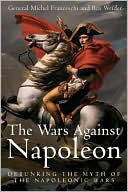

 |

|

Sold Out
Book Categories |
Popular and scholarly history presents a one-dimensional image of Napoleon as an inveterate instigator of war who repeatedly sought large-scale military conquests. General Franceschi and Ben Weider dismantle this false conclusion in The Wars Against Napoleon, a brilliantly written and researched study that turns our understanding of the French emperor on its head.
Avoiding the simplistic clichés and rudimentary caricatures many historians use when discussing Napoleon, Franceschi and Weider argue persuasively that the caricature of the megalomaniac conqueror who bled Europe white to satisfy his delirious ambitions and insatiable love for war is groundless. By carefully scrutinizing the facts of the period and scrupulously avoiding the sometimes confusing cause and effect of major historical events, they paint a compelling portrait of a fundamentally pacifist Napoleon, one completely at odds with modern scholarly thought.
This rigorous intellectual presentation is based upon three principal themes. The first explains how an unavoidable belligerent situation existed after the French Revolution of 1789. The new France inherited by Napoleon was faced with the implacable hatred of reactionary European monarchies determined to restore the ancient regime. All-out war was therefore inevitable unless France renounced the modern world to which it had just painfully given birth. The second theme emphasizes Napoleon's determined efforts ("bordering on an obsession," argue the authors) to avoid this inevitable conflict. The political strategy of the Consulate and the Empire was based on the intangible principle of preventing or avoiding these wars, not on conquering territory.Finally, the authors examine, conflict by conflict, the evidence that Napoleon never declared war. As he later explained at Saint Helena, it was he who was always attacked-not the other way around. His adversaries pressured and even forced the Emperor to employ his unequalled military genius. After each of his memorable victories Napoleon offered concessions, often extravagant ones, to the defeated enemy for the sole purpose of avoiding another war.
Lavishly illustrated, persuasively argued, and carefully illustrated with original maps and battle diagrams, The Wars Against Napoleon presents a courageous and uniquely accurate historical idea that will surely arouse vigorous debate within the international historical community.
Franceschi, a retired French army officer and special historical consultant to the International Napoleonic Society (INS), and Weider (The Murder of Napoleon), a businessman and founder of the INS, seek to recast Napoleon Bonaparte as a "peaceful creative genius"-even a "pacifist"-in this provocative apologia. The authors set out to debunk the "myth" that Napoleon's "inexhaustible ambition" was responsible for the eponymous wars that marked his rule in France. Rather, the authors argue, Napoleon was not only "the person least responsible" but also the victim of Revolutionary France's enemies. The authors' favorite villain is the "warmongering" British, but they also apportion blame among Prussia, Spain, Austria and Russia. Napoleon's only ambition was the "great work of reconstructing France," and "the unchanging foundation" of his foreign policy was "the principle of preventing war." They also excuse him for French battlefield losses and attribute the Waterloo defeat to "the most inopportune of thunderstorms." Franceschi and Weider's one-sided, revisionist defense of Bonaparte as "a sensitive soul" with a "pacifist disposition" promises to be controversial. Illus. (Jan. 31)
Copyright 2007 Reed Business InformationLogin|Complaints|Blog|Games|Digital Media|Souls|Obituary|Contact Us|FAQ
CAN'T FIND WHAT YOU'RE LOOKING FOR? CLICK HERE!!! X
 You must be logged in to add to WishlistX
 This item is in your Wish ListX
 This item is in your CollectionThe Wars Against Napoleon: Debunking the Myth of the Napoleonic Wars
X
 This Item is in Your InventoryThe Wars Against Napoleon: Debunking the Myth of the Napoleonic Wars
X
 You must be logged in to review the productsX
 X
 X

Add The Wars Against Napoleon: Debunking the Myth of the Napoleonic Wars, , The Wars Against Napoleon: Debunking the Myth of the Napoleonic Wars to the inventory that you are selling on WonderClubX
 X

Add The Wars Against Napoleon: Debunking the Myth of the Napoleonic Wars, , The Wars Against Napoleon: Debunking the Myth of the Napoleonic Wars to your collection on WonderClub |